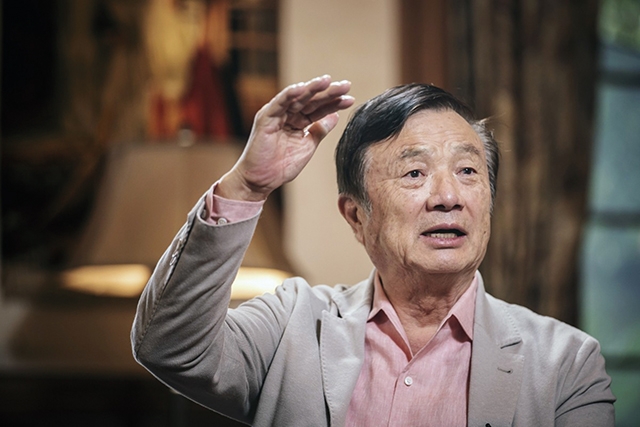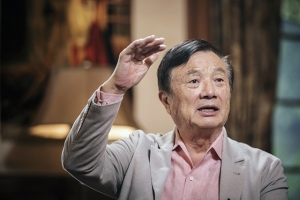Ren Zhengfei's Northern European Media Roundtable, Part 3
Ren Zhengfei, Huawei CEO, welcomed media from northern Europe to a roundtable and invited them to ask whatever they wished, however challenging the question. GEORGIA TODAY will be publishing those questions and answers in the present and following issues of GEORGIA TODAY newspaper.
Has this trade war, this tech war, actually been in favor of Huawei and Chinese tech companies in your push to become more self-reliant on equipment?
First of all, we don't want to see de-globalization happen. We should firmly pursue globalization. We have been forced to use our own components as a last ditch effort because the US stopped supplying us with their components. We don't want to collapse, so we are using more of our own components. But in the long run, we believe globalization will create more wealth for humanity. We firmly believe in globalization.
Will some Chinese companies grow big enough to overtake US companies? That's possible. But we are not counting on this possibility. I think the US is still the most powerful country in the world. We are not seeking de-Americanization or trying to decouple from the US. We have contingency plans in place to offset the impact caused by the US denying our access to US suppliers.
How do you see China's national security law and how does it affect Huawei? For example, a part of the law says individuals and organizations must cooperate with national security officers if needed. So does Huawei need to obey the law, too?
I don't quite get what this part means. Chinese leaders have clearly stated that no Chinese law requires Chinese companies to install backdoors in their equipment, and we comply with this instruction.
What's next after 5G? How do you see the future for Huawei and for competitor companies?
I think that following 5G, we will see the large-scale adoption of AI, but there are three basic preconditions for that. First, the availability of super-computing systems. Second, the availability of super-large-capacity data storage systems. And third, there must be super-fast connections between these two systems. When these conditions are met, AI will have huge potential.
In fact, AI was proposed by Alan Turing of the UK in the 1940s, but it only began to be applied 60 to 70 years later. Why is that? It's because these three preconditions had not been met until now. 5G is only a tool that supports AI with its low latency and large bandwidth. I believe that AI will develop rapidly around the world.
I think Europe will benefit most from AI, because European industry has very advanced systems engineering. They can use less labor to make more and better products. Europe is well positioned in this regard, because it has a relatively small population and has a well-trained workforce. With AI applied in production systems, they will be able to make more products. That's why I think that Europe will benefit most from 5G and AI. Huawei, Ericsson, and Nokia have set up the 5GAA and the 5G-ACIA. Both of them will promote better use of AI in production systems.
Will China also benefit this much from AI? I don't think that will be possible in the near future. This is because China's industry has just moved from manual to mechanical. The next step will be to move to automation and then to digitization. Only after we go digital will AI have a major role to play. So it will take a longer time for AI to play a role in China.
How do you think that 5G and AI will change society and the way we live?
This question is too complex for me and I don't have enough knowledge to give a proper answer, but I can give you two examples.
In China, there is a 500-hectare farm that entirely relies on AI for production management, with no farmers working there. There is also a mine in Northeast China, but its operators are located in Shanghai.
If there were another disaster like the explosion at the Chernobyl nuclear power plant, we wouldn't have to send 600,000 soldiers for rescue and cleanup operations, like the Soviet Union did; we could use AI to operate robotics instead for the rescue efforts. Even today, we are moved by the spirit of sacrifice demonstrated by these Soviet Union soldiers. The first one to charge in, shovel in hand, was a lieutenant general. People can be exposed to high levels of radiation for 45 seconds at most; any longer could be fatal. At the time, 600,000 soldiers and thousands of helicopters carrying earth were sent to bury nuclear waste.
I don't know whether you have visited our mobile phone production lines. If you have, you may find that we have only a few people on the production lines. This is only partially intelligent production. If Europe uses this mode of production on a large scale, they would make more products with relatively few workers. This will translate into higher yields and returns and significantly reduce social conflicts.
What will AI ultimately bring to future society? I'm not sure. I'm still envisioning what AI will bring as it continues to develop.
Europe is the first region that has proposed the concept of digital sovereignty. I think it's a very wise decision. It acts as a lighthouse and sets a benchmark for the development of information society around the world. We used to emphasize physical boundaries because of geopolitical factors. We used to claim that things like mines and trains were all ours. Now when information travels around the world, digital sovereignty becomes necessary to support national development. We will resolutely support this concept.
We will go open source with our AI ecosystem to support the innovation and development of European start-ups and small businesses. Our goal is to share success with our European partners, not to be the sole winner.
It seems that everybody is happy with the cyber security report that the EU made. But is there a Chinese company name between the lines of that report?
I don't think so. First, the EU has proposed that everything should be determined based on the facts as that is fair to all vendors. Second, vendors should first promise that they will not build backdoors into their equipment and then should subject themselves to review. I think this is a scientific approach as it applies to all vendors. We support and welcome this approach. Different countries and people, including lawmakers, may have different interpretations or opinions. I think the conclusions of the report are fair.
You started your career in the Chinese army, the PLA, and later on you created this empire. Do you understand why some people outside China are very confused? Are you basically a good old communist inside, or a capitalist? Do you have to choose between the two?
First, every soldier that chooses to leave the army is going to look for a new job. It's like this in every country. In total, the Chinese army has discharged tens of millions of soldiers; it would be ridiculous for all of them to stay at home and not work. I was just one of these soldiers.
Second, regarding what kind of ideology Huawei follows, we don't really have a pretty label for what we are. There are over 90,000 employees who hold shares in Huawei. Even though I have more shares than any other individual, I still only have less than 1% of all shares. Of course, our mechanism may not work for other companies, but it works for us as a technology company. The company's wealth is in the brains of our employees instead of any special quality of mine. If I were to hoard all the rewards, people wouldn't stay with Huawei, and nothing would be left. We distribute shares to employees according to the value of their brains. This is the foundation of our so called ideology. It's not specifically based on any traditional ideology. I don't know what to call it exactly, but I guess it may be called employee capitalism.
Are you still the actual person who, at least for a couple of years, will guide the direction of Huawei?
Operational decisions are actually out of my hands, and I don't directly manage anything in particular. Instead, the Board of Directors does all that. I do have the right to veto decisions on certain major issues, but I've never actually used this right. I just consult with members of the Board of Directors on major issues.
How will developing your own chips and your own operating system, developing other equipment and services affect your revenue and profits going forward?
When people buy chips, what they are actually buying is the use of a bunch of math and physics equations. We had already been developing the data models for those equations, and that cost was already covered by our operational budgets over the years. Companies that don't develop their own chips need to bear this cost when they buy chips from other companies. This part is rather profitable.
Second, we manufacture a large number of chips. We will produce 270 million smartphones this year. Producing such a huge number of smartphones means that we may need to source chips from several different chip makers. We don't just use things on a small scale. Once you scale out these things, the cost drops.
Will you start selling chips to other companies too? Is it possible in the future?
We don't currently plan to do this.
Continued in the next edition of GT.











